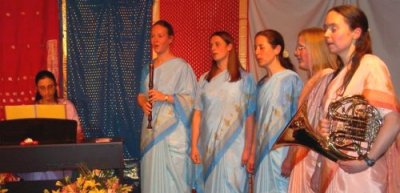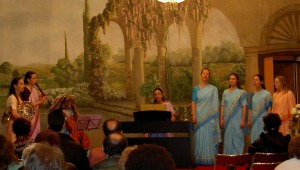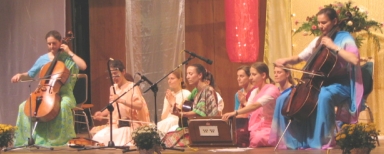Listen To Concert at Radio Sri Chinmoy
On 29 August 2007, the United Nations headquarters played host to a concert by an artist whose striving for inner and outer freedom in his music exemplifies the goals of that august Organisation. Boris Purushottama Grebenshikov is a household name in his native Russia, and in particular he is widely credited with helping to usher in a new wave of artistic freedom in perestroika-era Soviet Union.
Almost half of his 35-year music career was spent creating and performing music with his “peaceful guerrilla” band Aquarium in the face of heavy restrictions from the Soviet state. Aquarium began life in Soviet-era Russia producing records out of a studio disguised as an engineer’s club, and holding underground concerts in private apartments; the intimacy of these secret concerts can still be felt in Grebenshikov’s lyrical singing style twenty years later, and has often led to his being termed the Russian Bob Dylan.
Despite the restrictions, Aquarium’s music found its way to every corner of the Soviet Union via pirated tapes passed on from hand to hand, which meant they were universally well known by the time restrictions finally began to loosen, and Aquarium – with Grebenshikov as the creative force behind the helm – were invariably involved in many of the landmark steps which paved the way for full musical freedom in Russia.
The goals of affirming “the dignity and worth of the human person” expressed in the United Nations Charter are echoed in Grebenshikov’s lifelong musical search for inner freedom and happiness. “The world is a perfect place.”, he enthuses. “The problem with us humans is that we don’t see it, we’re not being taught to see it. There is a great silence inside of everybody, the source of all inspiration, of everything.†For Grebenshikov, music gives a window into this source, and points the way to a better and higher way of living. “It’s a living feeling.” he explains. “When I sing I just feel alive, only more alive than for example now. Now I’m sort of fifty per cent dormant, but when I sing that’s when I really liveâ€.
His search for inner meaning has also led to a long-standing interest in Eastern mysticism, spending much of the last 20 years travelling in India and Nepal and translating several important Hindu and Buddhist texts into Russian. The Eastern influence can also be seen in the name Purushottama, which was given to him by his friend and meditation teacher Sri Chinmoy, and which means “the one who goes beyond all limitations”. The concert was a wonderfully blissful experience for all who attended it, and Sri Chinmoy remarked afterwards that the performer had “brought down Heaven on earth”.
Related links:
- Video report on concert from Russia’s NTV station (in Russian)
- Official website of Grebenshikov and his band, Aquarium
- Boris Grebenshikov: beyond all limitations – article on shanemagee.com


